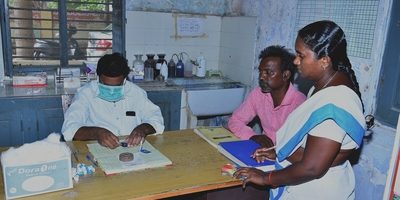
Covid-19 restrictions may have exacerbated India's TB problems: study by The George Institute, India
Findings show up to 7% TB patients stopped taking TB medicines during lockdown
A new study by the researchers at The George Institute for Global Health India examines the possible adverse impact of the Covid-19 pandemic restrictions on India's Tuberculosis (TB) control programme.
The Covid-19 pandemic resulted in hardships for people belonging to the poorer sections of society, but there had been little research into how it may have affected a particularly vulnerable group, such as those with TB, who require long term treatment.
This study is the first to show evidence of the negative impact of the Covid-19 nationwide lockdown on the income and health services utilisation of TB patients in India.
These findings were part of an ongoing cohort study aimed at examining the economic burden on TB patients in India by Dr Susmita Chatterjee, Senior Health Economist, The George Institute for Global Health, India; Palash Das, Research Fellow, The George Institute for Global Health, India; and Dr Anna Vassall, Professor of Health Economist, Department of Global Health and Development, London School of Hygiene and Tropical Medicine. Researchers noticed that patients reported difficulties in collecting TB drugs from public health facilities, with 4-7% of patients compelled to discontinue their medicines during the nationwide lockdown.
“Patients were finding it difficult to continue TB treatment because the government health facilities were focused on the pandemic and also, they could not travel due to travel restrictions.,” – said Palash Das, Research Fellow, The George Institute for Global Health, India
Findings of the study
The researchers examined the impact of nationwide lockdown on income and health service utilisation pattern on 291 patients with TB, including those from tea garden areas – a high risk group as defined in the national strategic plan for eliminating TB in India, 2017-2025. The findings reveal that more than half of households with a TB patient in the general population group and about a quarter of households with TB patients in high-risk group (in this case, tea garden workers) had no income during the complete ‘lockdown’ period.
“Many recruited patients belong to extremely low-income groups working as daily wage earners, contractual workers, etc. There is a clear need for their protection during such restrictions through measures such as paid sick leave, additional food support, etc.” – Dr. Susmita Chatterjee, Senior Health Economist, The George Institute for Global Health, India
What it means for the TB control programme in India
India has the largest number of TB patients in the world. According to the ‘India TB Report’ (published by the Central TB Division, Ministry of Health and Family Welfare, Government of India), about 2.64 million Indians had TB in 2019, with approximately 450,000 deaths. The Indian National TB control program aims to make the nation TB free by 2025, five years ahead of the Sustainable Development Goal target. These findings suggest that the Covid-19 pandemic may have an impact on the ongoing efforts to control TB in India.
The research paper was published in BMC Infectious Diseases. The full paper can be accessed here.
DOI - https://doi.org/10.1186/s12879-022-07681-z





